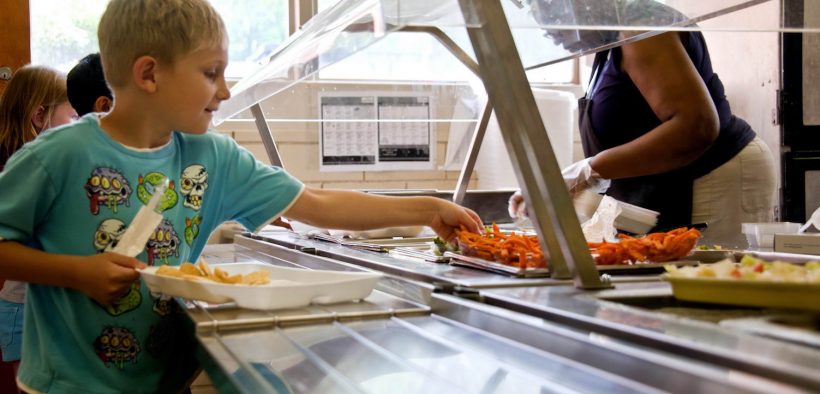NJ School District Bans Students With Lunch Debt From Prom, Field Trips

“In the U.S. in 2017, around 17% of children lived in food-insecure homes where at least one family member was unable to acquire adequate food due to insufficient money or other resources.”
A New Jersey school district is facing criticism after approving a policy that will bar students with lunch debt from extracurricular activities like Prom.
The policy bans high school and middle school students with over $75 in debt from buying school dance tickets, buying a yearbook, and attending field trips. Elementary school students will also be banned from field trips and after-school activities, reports People.
The Cherry Hill school district previously faced backlash after proposing to serve only tuna sandwiches to students with more than $10 in debt and refusing students with more than $20 in debt from lunch.
School officials defended the policy by arguing that some families with financial means simply choose not to pay the debt and that penalties can be waived by the principal on a case-by-case basis.
NJ.com reported that the district had $14,343 in unpaid meal debt in the 2018-2019 school year, though its food program still made a $200,000 profit.
Public Officials Respond To Lunch Debt Problem
Sen. Bernie Sanders and Rep. Ilhan Omar introduced a bill last week that would provide all children with lunches at public schools, noting the food insecurity of millions of poor children and the nutritional benefits that would help them focus and succeed in school.
“There are nearly 1 in 10 households in Minnesota that struggle with food insecurity, along with millions more across the country,” said Rep. Ilhan Omar. “We must find a way to address this crisis. When our children have empty stomachs, they cannot learn. They have more trouble concentrating. They are more likely to be absent or tardy. Study after study finds that access to meals increases child participation.”
Meanwhile, the United States Department of Agriculture, which runs the National School Lunch Program, has said it cannot wipe out student lunch debt. The Trump administration has moved to slash health standards for school lunches and cut food stamps.
School Lunch Debt As A Symbol Of Extreme Inequality
Recent reports of children being punished and humiliated because of their lunch debt, such as a nine-year old who had his lunch taken away in front of other students on his birthday last month, come as the super rich continue to gain in their share of the economic pie.
As Common Dreams‘ reported on Tuesday, Credit Suisse’s annual Wealth Report published on Monday shows that “the millionaires of the world, who account for just 0.9 percent of the global population, now own nearly half of the planet’s $361 trillion in wealth while the bottom 56 percent of the population owns just 1.8 percent.”
The Credit Suisse report found that the U.S. gained 675,000 new millionaires over the past year, bringing the country’s total to 18.6 million, cementing its status as the world’s richest country and leader in both new and total millionaires.
Meanwhile, new work from economists Emmanuel Saez and Gabriel Zucman shows that in recent decades, taxes on the wealthy have sharply decreased, while taxes on lower income brackets have largely stayed the same, culminating in the wealthiest 400 Americans paying lower tax rates than any other income group for the first time in 2018.
An analysis of Federal Reserve data in June found that the top 1% gained $21 trillion over the past two decades, while the bottom 50% of the population lost $900 billion during the same period.
Although the mega-rich have done extraordinarily well in the modern era, the majority of Americans have seen almost stagnant wages for the past four decades, while basic living costs like housing, healthcare, and education have increased. Life expectancy has been declining for years in an unprecedented trend.
This is because a combination of policy changes – financial deregulation, union busting, cuts on the taxes that most impact the wealthy, such as the estate, capital gains, and corporate tax, globalization through corporate-written trade deals like NAFTA, monopolization, and other trends – have tweaked the market to distribute more of its gains to the rich and less wealth to labor.
Billionaire hedge fund CEO Ray Dalio has described the treatment of poor children in America as a clear signal of the need for systemic change:
“The childhood poverty rate in the U.S. is now 17.5% and has not meaningfully improved for decades,” wrote Dalio. “In the U.S. in 2017, around 17% of children lived in food-insecure homes where at least one family member was unable to acquire adequate food due to insufficient money or other resources. Unicef reports that the U.S. is worse than average in the percent of children living in a food-insecure household (with the U.S. faring worse than Poland, Greece, and Chile).”
Critics argue that the exclusion of children from school events because of lunch debt epitomizes the flaws of modern American capitalism, and explains the popularity of populist candidates like Bernie Sanders and Elizabeth Warren, who have each pledged to fight against school lunch debt for children.
“There are very few countries where people get so little for their taxes,” tweeted political commentator Felix Biederman, in response to an article about the punishment for children with lunch debt.















